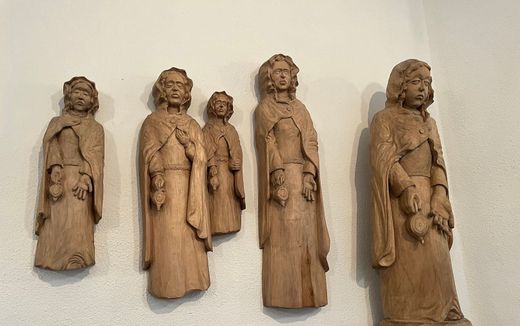Guest commentary: How a TV show illustrates Christian hypocrisy

The movie "Beef" shows what Christian hypocrisy can lead to. Photo Netflix
Opinion
I won’t deny it any longer: I am a hypocrite. And I realised this while watching Beef, one of the most acclaimed TV shows of 2023. In the same week, I had a heated argument with a close acquaintance. Despite our conflict, we both claimed to be followers of Christ.
The TV miniseries Beef presents two Asian-Americans, Danny Cho and Amy Lau. They have had a road rage incident of such magnitude that will eventually consume their thoughts and actions. The story leads to a dramatic struggle between the two.
In the third episode of the series, the main character, Danny Cho, has a coming-to-Jesus moment. Through the series, step by step, he becomes a worship leader in an Asian-American church.
You might expect the coming-to-Jesus moment to change Danny Cho’s personal, professional, and social life, but you don’t see that. It seems to be just a cathartic moment and nothing else. Danny Cho remains the same old Danny Cho. Although he becomes a Christian, he continues the conflict with Amy Lau.
Troublesome
Of course, I’m analysing fiction. Yet, the creator, Lee Sung Jin, spoke the harsh truth. I am still trying to figure out his intentions in touching this subject. However, his TV miniseries surely underlined something troublesome about the hypocrisy of modern-day Christianity in a nuanced but simplistic way.

Coming-to-Jesus moments are widely celebrated, as they should be. But the overall problem is that the Gospel has been whitewashed. It is no longer about coming to Christ, repenting from one’s sins, and becoming a new person in Christ’s image. No, it is just saying a prayer, and that’s all.
This is ludicrous. The apostle Paul greatly emphasised in his epistles that a person’s life should change 180 degrees when he comes to Christ. “Therefore, if any man is in Christ,” he writes in 2 Corinthians 5:7 (Modern English Version), “he is a new creature. Old things have passed away. Look, all things have become new.” The new Christian has come out of darkness and stepped into the light.
In Colossians 3, the apostle Paul tells Christians that they have died, and their life is now hidden with Christ in God. He urges them to put to death sexual immorality, impurity, lust, evil desires, and greed, as they once used to walk in these ways. Moreover, the apostle goes on to tell them that they should rid themselves of anger, rage, malice, slander, filthy language, and lying, as they “have put on the new self, which is being renewed in knowledge in the image of its Creator” (Colossians 3:10 MEV).
Fight against sin
If I read Paul correctly, a real coming-to-Jesus moment means a complete transformation of a person. While they are not perfect and continually will have to fight against sin in their lives, the fruits of their salvation will be made palpable. Christ told His disciples that “you will know them by their fruit” and went on to say to them that “every good tree bears good fruit. But a corrupt tree bears evil fruit” (Matthew 7:15-20 MEV).
All aspects of life will be transformed when a person becomes a genuine Christian. It is not only a personal transformation but professional and social as well. Every facet and every angle of life will change. They will indeed be a new person. People who claim to be Christian because they said a prayer but have no fruit might fool themselves.
Back to the Beef show: While Lee Sung Jin’s TV miniseries sheds light on an Asian-American church, we see the same pattern across the West. Evangelical churches in my beloved country, Romania, present the same problem. People can claim to be Christians because of their cathartic experience, but you don’t see a change in their daily walk of life. This is what I call hypocrisy.
Darkness
This is important. Christians are called to examine their lives and walk with Christ. Their works do not save them. However, the fruits should be palpable. If a person claims to be a Christian, but they bear fruits of darkness and not light, as God is the Father of light (James 1:17), this should give them much to consider.
We must ask ourselves: Did we have a real encounter with Christ? Is the fruit of the Spirit a reality in our life? Danny Cho cried during a worship song and “felt” the presence of the Spirit. But his life has not been radically changed and therefore bears no fruit of the Spirit. Are we like him? These are tough questions we should ask ourselves to ensure we are on the right path.
If Danny Cho had had a real encounter with Christ and become a new person, he would have put away all anger, rage, malice, and slander. This would have given him no choice but to love others as Christ loved him and seek reconciliation with Amy Lau instead of revenge and retaliation. Furthermore, he would have taken accountability for his part in the conflict.
Even devoted Christians are not perfect. They will continue to struggle with sin all their life. However, the key word here is struggle; they don't derive pleasure from it. Furthermore, while they are not perfect, the fruits of the Spirit, though they might be more or less, are palpable. Good deeds cannot earn one’s salvation. They are only the result of one’s salvation in Christ.
Forgiveness
As for my close acquaintance and me, our ‘beef’ has since ceased, and we are back on the right track now. We both apologised for our part in the conflict and moved on with our lives. It is important to note that while it is unfortunate that Christ’s followers have disputes with one another, the Holy Spirit will stir up their hearts and bring them to repentance.
Ultimately, as Christians, we are all guilty of hypocrisy to a greater or lesser extent. That’s because to claim to be a Christ follower is easy, but to follow through with all that entails is another thing altogether. Strangely, Danny Cho, more or less, represents all of us, and that’s because choosing to show forgiveness and love instead of being hateful and spiteful is not easy.
Related Articles
No Tags found












